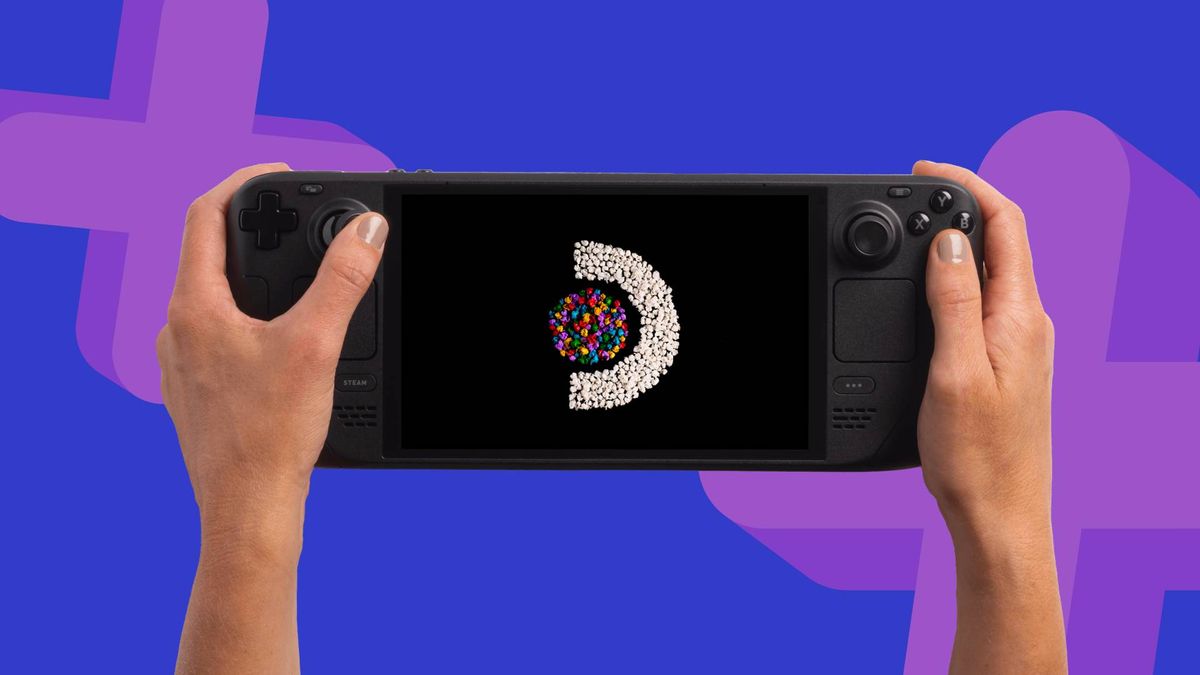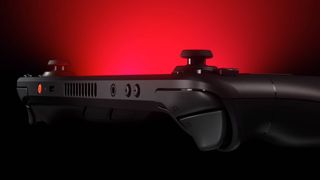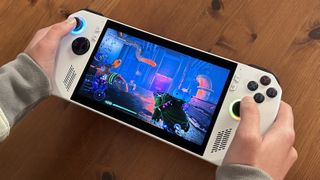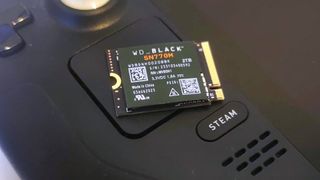The Steam Deck OLED looks dope, but I’m waiting to see what Black Friday has to offer
To OLED or not to OLED

Recent updates
21 February, 2024: Heads up, our Steam Deck OLED review is now live, so you'll want to swing by our rundown for more on Valve's latest handheld.
I’ve been rooting for the Steam Deck from day one, and I’m pretty hyped about what the fancy new OLED version will bring to the fold. Yet, I’m also big and ugly enough to know that letting the prospect of a refreshed handheld distract from the fruits of Black Friday would be foolish, as the scene will have plenty to offer players for less than usual. So, with that in mind, I thought it might be worth covering whether you should wait to pick up the revamped portable powerhouse, upgrade to something with more oomph, or just stick with Valve’s original device during this year’s big sale.
It’s no secret that Black Friday Steam Deck deals are a thing, and they’ve already sort of here thanks to the new OLED edition. Valve has already slashed the price of its original LCD model to just $349 for the 64GB version, with the premium 512GB model coming in at just $449. The huge price drop comes with some bad news, though, as these specific OG champions are being phased out to make way for the newbies, which come in at $549 and $649 respectively. You’ll still be able to bag the 265GB original for $399, but you can wave goodbye to the other options.
This preamble about new prices has a purpose, as it frames exactly why taking advantage of Black Friday gaming deals this year is essential. For many of you out there, one of the retiring Steam Deck models could be the best gaming handheld for your specific needs. On the flip side, moving away from Valve’s ecosystem altogether to something more premium like the Asus ROG Ally or Ayaneo 2S could be a better decision overall, so I’ve got a few suggested things to consider before automatically settling for the Steam Deck OLED.

How much do you care about OLED screens?
I’m GamesRadar’s resident gaming monitor nerd, so I’m well aware of the beauty of OLED screens and the exceptional contrast they provide. Hell, I’ve been arguing the bit for the tech since the PSVita arrived, and the idea of a Steam Deck OLED model has lived in my head rent free since the handheld made its debut.
Before automatically assuming the Steam Deck OLED is the portable pal for you, I’d urge you to think about whether you even care about what it’ll provide. If you’re used to using a Nintendo Switch OLED, your peepers may have adjusted to the inky black, crispy contrast, and superior colors on offer, providing reason enough to want the same experience when playing Steam games on the go.
However, if you aren’t really the type of player who even thinks about color accuracy or contrast, splashing out on the newcomer might not be that beneficial. Sure, you might think it looks pretty, but if you think the thought will never really pass your mind while delving into your backlog, then you’ll be much better off grabbing one of the to-be-discontinued versions (or another portable PC altogether).

Are you really waiting for the Steam Deck 2?
It might be obvious, but the Steam Deck OLED model isn’t the Steam Deck 2. Don’t get me wrong, the new edition is a slightly different beast from the 2022 handheld, but you’re not going to get the performance uplift you’d expect from a new gen release. To actually obtain something that’ll boost fps further, you’re going to either need to wait for a next generation Deck, or pay a bit more for something like the Asus ROG Ally.
Sign up to the 12DOVE Newsletter
Weekly digests, tales from the communities you love, and more
Before I get branded as a big Steam Deck hater, I’m not saying everyone should buy the Ally over Valve’s portable. Both handhelds have their own pros and cons, and it’s not even just about the hardware. That said, if we’re sticking to the physical side of things, the AMD Ryzen Z1 Extreme APU inside Asus’ contender is going to provide higher frame rates overall, and even the refreshed ‘Sephiroth’ chip inside the OLED version isn’t going to change that.
Naturally, the price difference is a reason just to stick with cheaper Steam Deck iterations, but the flagship Asus ROG Ally has $80 off at Best Buy. Therefore, if performance is a priority, it’d perhaps make more sense to consider spending a bit more (while also saving compared to usual). It’s either that or waiting for Valve to come up with something completely new, and that’s not going to be any time soon.

Do you care more about refresh rate?
I’m painfully aware of the fact I’m about to recommend something other than the Steam Deck again, but if you want to be playing games at least 120Hz, it’s not the best option. The new OLED model does boast 90Hz capabilities, and that’s going to make a huge difference in anything that actually runs well above 60fps. Yet, even the cheapest Asus ROG Ally ramps things up to that 120Hz sweet spot, with the new Lenovo Legion Go taking things up to a pretty impressive 144Hz.
Not everyone is going to care about refresh rates above 60Hz, especially since the benefits diminish when playing at lower frame rates. And realistically, you’re probably going to be struggling to match 60fps in many new releases on even premium handhelds without dialling back settings. Nevertheless, if speed is vital, it’d probably make more sense to take advantage of Black Friday and grab the lower spec Asus ROG Ally, as it’s currently down from $599.99 to $499.99. It still features most of the same great qualities as the model we reviewed during the summer, but performance is closer to that of the Steam Deck.

Is this all about storage?
The Steam Deck OLED is the first Valve handheld to feature 1TB storage by default, and that’s a huge selling point in itself. I used the 512GB version for the best part of a year, and I know too well how much of a pain swapping out downloads is, especially since new PC games can take up more space than ever. If you’re interested in everything the new system has to offer, then the chonkier SSD is just another perk. However, if your sole focus is capacity, then you’ll want to instead consider how Black Friday can help you achieve the same for less.
I’m currently testing WD_Black’s new Steam Deck-sized SN770M SSD for review, and it has effectively doubled the handhelds capacity without caveats. Simply put, in terms of storage, I’ve now already got what the Steam Deck OLED provides, but it did admittedly require messing with my portable pal’s innards. If you’d prefer to be thrifty about it, you could pick up the cheapest Deck available at the moment and pair it with a 2230 drive like the aforementioned SN770M or even the more affordable Sabrent Rocket.
Ultimately, you’ll end up with at least 1TB storage and still pay less, even if that means missing out on the new Steam Deck’s perks. I know for a fact some of you will be tempted to trade away your existing handheld to pick up the OLED version, and pitching the idea of an SSD upgrade may provide you with one less excuse. Black Friday SSD deals are going to help you do it for less than ever, especially if you’ve already got a Deck to hand.
The above questions simply serve as a pause for thought, as Black Friday will kick in just after the Steam Deck OLED arrives on the scene. I’m still looking forward to taking the latest version for a spin, but I am still keen to see how the annual sale can facilitate an alternative handheld experience for less. All I’m really saying is, weigh up your options and take full advantage of every discount out there, whether they’re Valve flavored or not.
Looking for more specialist PC sales and deals this winter? Then get prepared for the Black Friday graphics card deals, Black Friday SSD deals, and Black Friday gaming headset deals to fill out your setup.

I’ve been messing around with PCs, video game consoles, and tech since before I could speak. Don’t get me wrong, I kickstarted my relationship with technology by jamming a Hot Wheels double-decker bus into my parent’s VCR, but we all have to start somewhere. I even somehow managed to become a walking, talking buyer’s guide at my teenage supermarket job, which helped me accept my career fate. So, rather than try to realise my musician dreams, or see out my University degree, I started running my own retro pop culture site and writing about video games and tech for the likes of TechRadar, The Daily Star, and the BBC before eventually ending up with a job covering graphics card shenanigans at PCGamesN. Now, I’m your friendly neighbourhood Hardware Editor at GamesRadar, and it’s my job to make sure you can kick butt in all your favourite games using the best gaming hardware, whether you’re a sucker for handhelds like the Steam Deck and Nintendo Switch or a hardcore gaming PC enthusiast.
Most Popular


